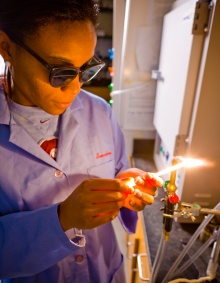Undergraduate Education
The Material Science and Engineering BS degree program is designed to train students in data science methods, and to apply these methods to the study of material structure and behavior.
The material science and engineering degree program offers a materials informatics foundation together with a “wet lab-dry lab” paradigm for integrating experimental and computational training in materials research. By offering a strong materials core integrated into the use of data science techniques, graduates of the program will be a position to collaborate and communicate with practicing scientists from many fields.
Accreditation

The Material Science and Engineering BS program is accredited by the Engineering Accreditation Commission of ABET under the commission's General Criteria and Program Criteria for Materials, Metallurgical, Ceramics, and Similarly Named Engineering Programs.
To ensure that our students are well prepared for success in their future careers, the department follows a formal procedure of continuous assessment and improvement of our curriculum.

A Material Science and Engineering BS degree from UB prepares students to understand the processing, analysis and use of materials essential to the development of new ideas for the betterment of society.
The faculty provide rigorous academic training to our students, and our graduates are professionals with a deep understanding of the tools of synthesis, characterization and data analysis necessary to contribute meaningfully in any of the diverse professional career paths they may choose.
Graduates learn how to communicate effectively with people from different specialties and work effectively in multidisciplinary teams. These graduates are cognizant of the economic, social and environmental implications consequent to the processing and use of materials, and respond ethically and equitably to these challenges. MSE graduates will:
- Demonstrate professional competence, broadly defined, by assuming a role of increasing importance within an organization or business, or by making progress towards an advanced degree.
- Contribute to society by applying their knowledge and skills in their chosen field of endeavor.
- Continue to develop both personally and professionally, building on a broad and multidisciplinary educational background.

Student outcomes describe what students are expected to know and be able to do by the time they graduate. They relate to the knowledge, skills and behaviors students acquire as they progress through the materials science and engineering program. They include:
- An ability to identify, formulate, and solve complex engineering problems by applying principles of engineering, science, and mathematics
- An ability to apply engineering design to produce solutions that meet specified needs with consideration of public health, safety, and welfare, as well as global, cultural, social, environmental, and economic factors
- An ability to communicate effectively with a range of audiences
- An ability to recognize ethical and professional responsibilities in engineering situations and make informed judgments, which must consider the impact of engineering solutions in global, economic, environmental, and societal contexts
- An ability to function effectively as part of a team whose members provide leadership, create a collaborative and inclusive environment, establish goals, plan tasks, and meet objectives
- An ability to develop and conduct appropriate experimentation, analyze and interpret data, and use engineering judgment to draw conclusions
- An ability to acquire and apply new knowledge as needed, using appropriate learning strategies